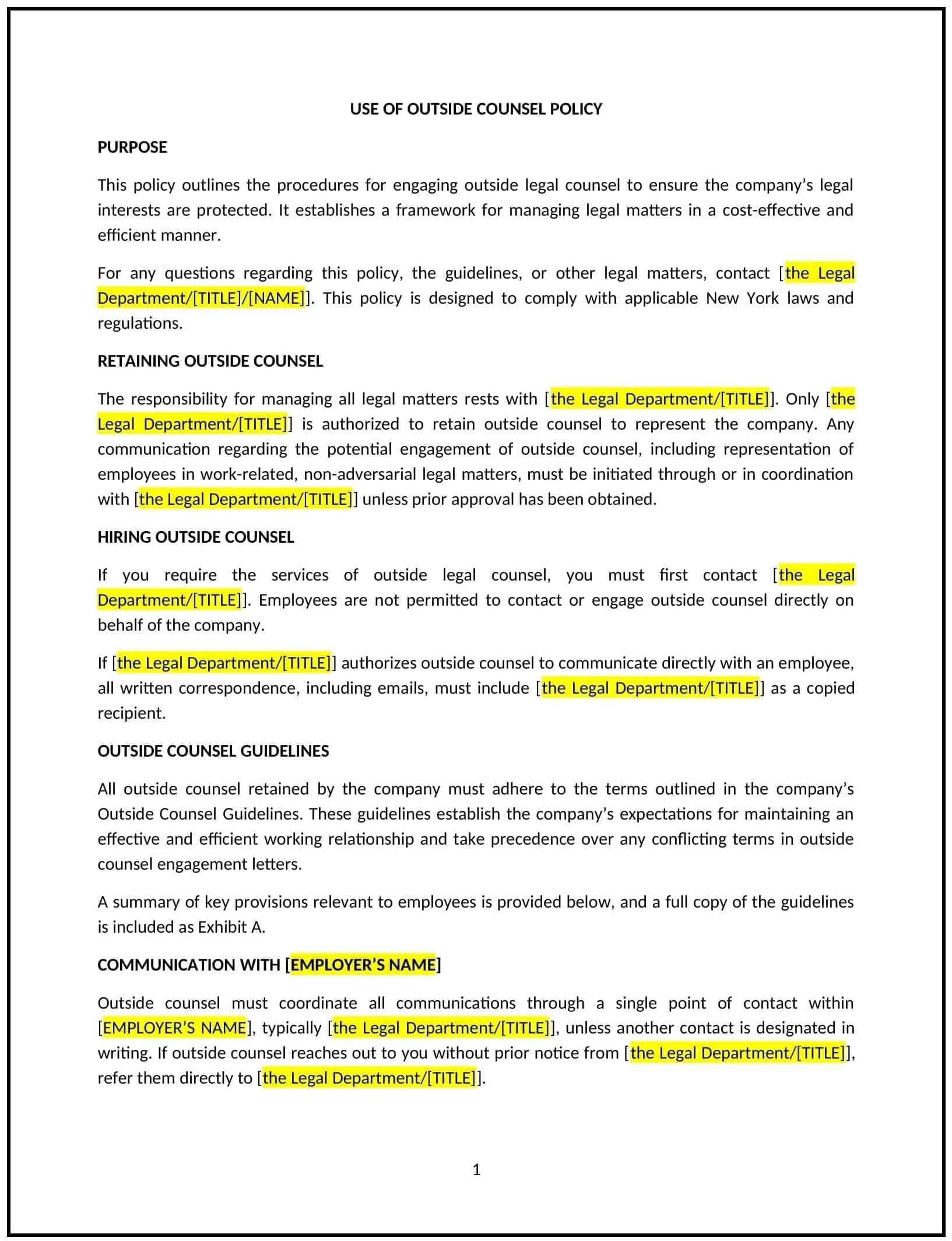Use of outside counsel policy (New York): Free template
Got contracts to review? While you're here for policies, let Cobrief make contract review effortless—start your free review now.

Customize this template for free
Use of outside counsel policy (New York)
This use of outside counsel policy is designed to help New York businesses establish clear guidelines for engaging external legal counsel. Whether businesses need specialized expertise, legal advice, or representation in legal matters, this template provides a structured approach to managing relationships with outside law firms or attorneys.
By adopting this template, businesses can ensure that the selection and management of outside counsel is efficient, cost-effective, and aligned with company objectives.
How to use this use of outside counsel policy (New York)
- Define when to use outside counsel: Clearly specify the circumstances under which outside counsel should be engaged, such as for complex legal matters, specialized legal areas, or when in-house resources are unavailable.
- Set approval procedures: Outline the process for selecting and engaging outside counsel, including the approval from relevant internal stakeholders such as senior management or legal department heads.
- Address budget and fee structures: Provide guidelines for agreeing on fees with outside counsel, including hourly rates, flat fees, or contingency fees, and the process for monitoring and managing costs.
- Establish communication protocols: Define how and when outside counsel should report progress, and outline expectations for regular updates, transparency, and access to relevant case information.
- Set performance expectations: Outline the expectations for quality, responsiveness, and efficiency when working with outside counsel, and establish criteria for evaluating their performance.
Benefits of using this use of outside counsel policy (New York)
This policy offers several benefits for New York businesses:
- Controls legal costs: Clear guidelines for selecting and managing outside counsel help businesses maintain control over legal expenses and avoid unnecessary costs.
- Promotes efficiency: Standardizing the process for engaging outside counsel ensures that legal matters are handled in a timely and effective manner, minimizing delays.
- Ensures alignment with business goals: A structured approach ensures that outside counsel understands the business objectives and can provide legal advice that aligns with the company’s strategic priorities.
- Improves legal outcomes: With clear performance expectations and regular communication, businesses can achieve better outcomes from legal matters handled by outside counsel.
- Enhances accountability: A defined process for monitoring and evaluating outside counsel ensures that legal services meet the company’s quality standards and legal requirements.
Tips for using this use of outside counsel policy (New York)
- Communicate the policy: Ensure that all relevant internal stakeholders are aware of the policy and understand when and how to engage outside counsel.
- Set clear guidelines for fees: Establish clear expectations for billing practices, and ensure that fees are agreed upon upfront to prevent disputes later.
- Monitor performance: Regularly assess the performance of outside counsel by reviewing case progress, outcomes, and cost-effectiveness.
- Foster a collaborative relationship: Maintain open communication with outside counsel to ensure that they are well-informed of the business’s needs and objectives.
- Review regularly: Update the policy periodically to reflect changes in the business’s legal needs, budget, or New York state regulations.